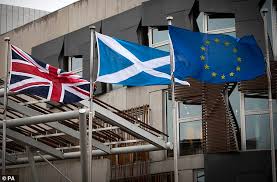Brexit: Regrets, Economic Consequences and Scottish Independence
The Brexit referendum took place on June 23, 2016 (www.gov.uk). The story and vote was lightly covered here in the US. At the time, the battle to eliminate ISIS, Donald Trump and his Stormy Daniels escapades, and of course, the pointless, money wasting Robert Mueller investigation were all seemingly more important stories. The monumental decision to leave the European Union passed by a slim 52-48 percentile result. Other than large cities London, Manchester, Liverpool, to name a few, all regions of England (strongest results coming from the Midlands) voted to leave. Wales also voted to exit the EU bloc, while Northern Ireland and Scotland (with highest vote to remain over 60%) choose to stay (numbers courtesy of Statista.com). As time drew closer to the original withdrawal date of March 29, 2019 (date courtesy of BBC) the news media began, in earnest, picked up on the coverage. Around the world the realization of the impact on not just the UK and the EU, but internationally began to sink in. As time went by, and Brexiteers like Matthew Elliot, Dominic Cummings and most of all, Brexit at all cost, former member of Parliament turned broadcaster, Nigel Farange, came to the forefront. Anti-Brexit activists including, businessman entrepreneur Charlie Mullins, former Labour Party leader Jeremy Corbyn and Guinness Record holder, filmmaker, television presenter, Graham Hughes, just to name a few, lead various Stop Brexit, pro second vote referendum rallies to try and reverse course on the Brexit decision. The Brexiteers would eventually win out, as no second voting referendum happened. Theresa May, conservative party Prime Minister from 2016, to her unceremonious departure in 2019, tried and monumentally failed at numerous attempts at a sufficient exit deal with Brussels and their various negotiators. We'll be going through the many consequences of Brexit, economically, border issues with Ireland and the possible departure of long time UK member Scotland.
After a copious amount of extensions due to the fears of the so called "No Deal Brexit" with Brussels and the EU, the United Kingdom's official departure didn't come to fruition until January 31, 2020, four brutally contentious years after the original vote. Theresa May mercilessly was replaced by Boris Johnson as Prime Minister in 2019 after his landslide victory over Jeremy Corbyn, who was later replaced controversially, by Keir Starmer as head of the Labour Party. Corbyn has extremely loyal supporters who blamed this decision on Corbyn's sympathetic feelings toward Palestine and Anti-Zionist stances, therefore leading to unfounded claims of Anti-Semitism. Boris Johnson has been a total disaster as Prime Minister, treating covid-19 in a Trumpian manner only to catch the virus and nearly die from it. Just as the United States has, England's been battered especially hard by the pandemic to the tune of 3.6 million cases and 106,000 deaths to date(numbers courtesy of Google.com). Similar to their American brethren the virus continues to rage and many feel Boris Johnson's sheer incompetence, as well as the country and Johnson's preoccupation with Brexit, it's impending date and continued negotiations.
Finally after nearly half a decade of failed negotiations the two parties agreed to the EU-UK Trade and Cooperation Agreement on December 24 2020, just 7 days before the last possible date of a deal on January 1st 2021 (info courtesy of ec.europa.eu). The deals main positive sticking point was avoiding the dreaded hard border with Ireland. Many fears arose within both Ireland and Northern Ireland that without an agreement involving free border crossings the "Good Friday Agreement" signed in April of 1998 (date courtesy of Irishpost.com) would be in serious jeopardy, which could've lead to a possible return to violence between rival factions the IRA and Ulster paramilitary groups that fought against one another since the early 20th century a time period known as "The Troubles". Other positive aspects of the EU-UK deal was that the UK are still able to buy and sell goods with EU nations with zero tariffs or quotas. The final and perhaps a favorite for the pro-Brexit side is the U.K.'s ability to negotiate new trade deals with other countries without any input from the EU.
It's by no means all a bed of roses for the UK though, due to the last minute signing of the agreement, United Kingdoms companies were forced to rapidly adapt to the various customs implementations. These problems have caused a slowdown in the flow of goods across the English channel into continental Europe, that obviously wasn't an issue prior to Brexit. Economically the most damaging consequence could be London no longer being the financial hub of Europe. Many EU/based firms used London as the headquarters for their company's production and exports. London was also attempting to join New York City as a worldwide home of global finance. Thanks to Brexit those hopes have and will take an enormous hit, most likely lowering London's previous prestige.
Scottish Independence
Since 1707 Scotland has been a member of the United Kingdom, to take that into perspective and to put into words is difficult, to say the least, but I'll give it go. The American Declaration of Independence wouldn't be signed for another 69 years, Napoleon wouldn't be defeated at Waterloo for another 108 years, how's that for some historical prospective? For 314 years Scotland and the other UK members have maintained enough of a cordial relationship to continue the partnership signed in the Act of Union on May 1st 1707(information courtesy of Brittanica.com). Despite the well known hatred and many brutally bloody wars between England and Scotland during the 13th and 14th centuries, plus England's vicious treatment of Scotland as a vassal state before Scottish heroes William Wallace and after Wallace's death, Robert the Bruce, won the Battle of Bannockburn on June 24th 1314(courtesy of historic-uk.com). But enough with the history lesson, this is about the current situation, and the possibility of a vote for Scottish independence from the United Kingdom.
As currently mentioned, Scotland voted to remain in the European Union by a solid 60 percent. If a new Brexit vote had taken place say in 2019 the numbers more than likely been much higher. To put it frankly, the majority of the Scottish population is fed up with the United Kingdom, Boris Johnson is mostly despised as his net approval in one poll in Scotland sits at a shambolic -42 %, while 63% in the same poll wanted him to resign(poll courtesy of (www.thenational.scot). Meanwhile, Nicola Sturgeon and her Scottish National Party (SNP) remain the only UK leadership bloc with a positive approval rating of 57 percent, according to the same poll. She remains steadfastly Anti-Brexit and Pro-Independence. Deputy SNP leader, Keith Brown lauded Ms. Sturgeon's leadership through the coronavirus and also how she's went above and beyond to lead Scotland, as Boris Johnson has continually ignored the plight of the Scottish populace. His disdain for the UK member and his generally sub-standard overall leadership has been one of the driving forces toward the Scottish independence referendum the majority of the public are calling for.
Scexit, is a term cleverly used by investopedia.com, to describe Scotland's hopes of leaving the UK and rejoining the EU. Social Media has really taken quite an jnterest in the possibility of Scotland, after over 300 years becoming its own nation. As we've previously mentioned there are several reasons why many Scots have become almost fanatical (rightly so) about a divorce with the United Kingdom. The original idea of Brexit came about by a bunch of Tories obsession with returning to the "good old days" of the 19th century British Empire. At its peak, Britain had colonies all over the world, including, India, Hong Kong, Australia, and South Africa, to name a few. The arrogance of these charlatans to think in this day in age, an island the size of Alabama can up and leave the economic security of the 27 nation European Union, in my opinion, will turn out to be an extremely botched policy decision and ultimately will lead to failure. It's too early for the Brexiteers to express any regrets, they're still too busy taking victory laps and bowing to there reflections in the mirror. I for one, applaud the Scottish people for uniting and pushing for independence from the UK, who in my mind made a serious error in judgement and allowed certain crazed British nationalists to talk enough people in the UK to get behind the idea that the greatness of Britain made it no longer necessary to be a part of the European Union. A move that may not only be regretted for economical purposes but also the loss of the loyal, intelligent people of Scotland.



Should Scotland remain committed to a legal, constitutional route to an independent state, I see no reason why it cannot function as a bridge between the European Union and the United Kingdom. Brexit in its highest ideals should still represent the values of the EU -- liberty, the rule of law and respect for human rights -- making Britain an exemplary nation supporting freedom, democracy and equality even though it looses Scotland.
ReplyDeleteI thought Scotland would be better off without England. So the guy blocked me. He was Scottish.
ReplyDeletelol When I wrote this piece, I didn't want anyone to get the idea I believe all scots were for independence tried to use statistics, anyway thanks for taking your time to read it. And hope you enjoyed it
ReplyDeleteYes, I did. I also know very well that not all Scots were for independence. Not all Americans are for Donald Trump, wither. Not all Brits are for Brexit nor ever have they been. Keep up the writing, please!
DeleteThank you I'll certainly continue, do you have twitter?? My next one I'm working is working on is Trump's Legal Issues and I got a funny picture of ol Donny in an orange jail suit
DeleteTwitter: @honestcharlie I'll keep an eye out. :)
Delete